- Home
- Graham McNeill
The Killing Ground Page 2
The Killing Ground Read online
Page 2
High windows that glorified the Emperor and His many saints were shattered and empty, fragments of coloured glass jutting like teeth in rotted frames. The heavy iron doors that had once protected the main vestibule of the church lay twisted and broken on the cracked flagstones of the esplanade. Shattered statues lay beside the doors, fallen from the roof and left to crumble where they lay.
The wind collected here, as though drawn by some unseen imperative to gambol in the open square before the church. Wisps of mist were dragged along with the wind and fluttering scraps of cloth, paper and leaves spun in miniature whirlwinds as the strength of the wind gathered force.
The gaping blackness of the church's entrance seemed to swallow what little light was left of the day, and though the wind pulled the leaves and debris of the city back and forth with ever-greater vigour, none dared violate the darkness within the abandoned building.
A hollow moaning issued from the church, though nothing lived within it - or indeed in the entire city - and a gust of air, colder than the depths of space, blew into the square.
Beginning as spots of brightness against the black, rippling streamers of light oozed from the arched entrance and flowed like ghostly lines of mercury along the ground in two parallel tracks. Before, the church had seemed relentlessly solid and immovable, now its fabric seemed to ripple and warp as though in the grip of a monstrous heat haze.
The moaning built, rising from a far distant sound to something much closer, a shrieking howl of a thing in agony that fought to hold itself together as though its very sinews were being unravelled with every passing second.
The darkness of the church's interior swelled, billowing outwards like an explosive ink stain. Then it retreated, spilling back over something that had violated time and space to enter this world, a churning, seething remnant of a thing first given form in another age.
It resembled a great juggernaut machine of pistons and iron, its brazen flanks heaving with unnatural energies as it thundered from the church. Steam leaked from every demented, skull-faced rivet as wheels of rusted, dissolving iron ground the mercurial tracks beneath it.
Deep within its fragmenting structure, it might have once resembled an ancient steam-driven locomotive, but unknown forces and warped energies had transformed it into something else entirely.
Whatever power had once fashioned the monstrous, terrifying amalgamation of machine and dark energy now appeared to be working to unmake it. Flaring whoops of light streamed from it, peeling back like the layers of an onion. The very air seemed toxic to its existence, hissing clouds of stinking vaporous light billowing from its every surface.
The terrible machine screamed like a wounded beast, but deep within the aching agonies of its dissolution, there was a keening note of welcome release, as though an eternity of torment had come to an end. Its passage slowed until it came to a halt, like a hunted beast that had reached the end of its endurance and could run no more.
Within the tortured end of the machine, there was the suggestion of voices, a hint of things within it that were not part of its decay. The sounds of the voices grew stronger with each passing second, as though their owners called out from some freshly unlocked, yet still impossibly distant chamber.
As a portion of the juggernaut dissolved, it revealed a dreadful glimpse of the machine's red-lit interior, a stinking meat locker that reeked of unnumbered slaughters and debaucheries, roaring fires and an eon's worth of bloodshed.
Shapes moved within the light, a handful of figures that stumbled like newborns or drunks as they spilled like entrails from the dying machine. Tall, broad and humanoid, they scrambled and crawled from the light as though in pain.
The figures emerged from the armoured leviathan that had brought them to this world, wreathed in coiling wisps of smoke. Their steps were feverish and unsteady, but even unsteady steps were welcome, so long as they carried them away from the dissolving machine.
As the figures put more distance between themselves and the heaving engine, their shapes resolved into clarity, though, had an observer been watching this incredible arrival, he might have wished that they had not.
They were monsters: the Unfleshed.
They were twisted freaks of nature, the bastard by-blows of hideous surgery, failed experiments and dreadful power of unnatural origin. No two were alike, their skinless bodies massive and grotesque, their heads swollen, encephalic nightmares of distended eyes, ripped faces and gnashing fangs.
To see such things would have driven many a man mad with fear, but had anyone had the courage to look beyond the physical deformities and hideous malformations of bone and flesh, they would have seen something else, something that would no doubt have horrified them even more: the glimmer of human understanding and awareness.
Two other figures followed the monstrous creatures, as stumbling and as dazed as the monsters, but without the horrifying aberrations of the flesh that afflicted them. Both had the bulky, gene-built physique of Astartes. One was broader and more powerfully built than the other, although his right arm ended abruptly at the elbow.
One was clad in blue armour; the other in fragments of armour the same colour. The first wore his dirty blond hair tight to his skull, his features wide and open, while the other, dark haired, grey-eyed and wolf-lean, had a face that was stern and patrician.
Both warriors, for it was clear from the wounds and weapons they bore that these were men to whom the crucible of combat was no strange and unknown place, staggered away from the disintegrating machine, collapsing to the ground and heaving great draughts of cold air into their lungs.
With the disembarkation of its passengers, the mighty engine that had carried them squealed with the sound of metal grinding on metal as the burning wheels of iron dragged the strange and terrible machine away from the place.
Confined so long to realms beyond the material universe, its substance was unused to the assault of the elements that made up this existence, and the abrasive banality of reality was undoing its unknowable, warp-spawned structure as surely as a flame devours ice.
Its former passengers watched it gather momentum, moving slowly at first and then with greater speed as its form became ever brighter, as if some infernal power source within was drawing close to critical mass. Its brightness soon became too much to bear, even for those whose eyes were genhanced to withstand such things. With a tortured scream, though whether one of death or release none could tell, the living engine vanished in an explosion of light.
No violence or blast spread from this explosion, but a glittering rain of light fell and saturated the air with the sense of an infinite power having been released into the world.
With the final dissolution or escape of the great, immaterial engine, the gloom and dread of the dead city smothered the world once more, the rain bathing the bedraggled travellers in cold, clammy wetness.
The two Astartes warriors found each other in the rain, embracing like brothers at the simple joy of having returned to a world where the air was not a toxic soup of pollutants, ashen bone matter and the hot, sad smell of burned iron and war.
The bigger warrior ran a hand through his hair, frowning as he took in the dismal nature of their surroundings.
'Thank the Emperor,' he said. 'We're not on Medrengard!'
His companion smiled and tilted his head back, letting the cold rain run down his face, as though such a sensation was a rare and precious gift. 'No, Pasanius,' he said, 'we're not.'
'Then where are we?'
'I think we are almost home, my friend,' said Uriel Ventris.
THOUGH IT WAS dusk, Uriel's eyes could easily pierce the gloom enveloping the city once the afterimages of the Omphalos Daemonium's departure or destruction had faded. No trace remained of its passing, and Uriel was grateful to be rid of the vile daemonic creation.
Once it had been the infernal conveyance of a mighty creature of the warp, an engine by which it could traverse the dreadful regions of warp, time and space to wreak havoc on m
ortals throughout the galaxy. That daemon was gone, destroyed by another of its diabolical kind, allowing Uriel and Pasanius to escape the daemon world of Medrengard in its blood-soaked interior.
'Where do you think it's gone?' asked Pasanius, his hand resting on the butt of a purloined boltgun. Though his right arm was gone below the elbow, Uriel knew that Pasanius was equally adept at killing with his left. Uriel too was armed, a golden-hilted sword that had once belonged to Captain Idaeus, his mentor and former captain of the Fourth Company of the Ultramarines, gripped in one fist.
'I don't know and I don't care,' said Uriel, breathing the crisp air and relishing the fresh, wild scents carried from the forests that circled the mountains towering over them. He saw flocks of grazing beasts on the rugged flanks of the peaks, and the sight of something so unthreatening was absurdly welcome. 'I am just glad we're free of it.'
'Aye, there's that,' agreed Pasanius. 'Now we just have to figure out where it's dumped us. I certainly wasn't steering, were you?'
'No, but I don't think the Omphalos Daemonium was ever meant to be steered by the likes of us.'
'So we could be anywhere,' said Pasanius.
'Indeed,' said Uriel, as curious as his friend to know where they had been deposited. Though he had no idea why the daemon engine had chosen to end their journey upon this world, whichever world it was, he had spent the unknown period of time within its depths visualising Macragge and his home world of Calth, hoping against hope that thoughts of familiar places would somehow guide the mighty engine's course towards them.
It hadn't worked. This world neither looked nor felt like either of those worlds. The sky above was leaden grey, with brooding and dissatisfied clouds scudding around the peaks of the high, craggy mountains that looked down on the strange, abandoned city they found themselves within.
Uriel turned from the mountains to survey their more immediate surroundings, a wide, marble-flagged square choked with rubble and weeds. The buildings around the edge of the square had been cast to ruin by time and, unmistakably, the brutal effects of war. Bullet holes, laser scarring and promethium burns marked almost every inch of stonework and the cold sense of the lingering dead hung heavy in the air.
'So I wonder where this is?' said Pasanius, turning in a circle. 'It's Imperial at least.'
'How do you know that?'
'Look,' said Pasanius, nodding towards the building behind Uriel.
Uriel followed Pasanius's nod to see a double-headed, bronze eagle hanging at a forlorn angle from a tall building of blackened stone. The arched niches and statuary, though broken and in a state of gross disrepair, were unmistakably those of an Imperial temple. The Unfleshed gathered beneath the eagle, their heads craned back to stare in rapt adoration at the symbol of the Emperor.
'Or at least it was an Imperial world,' pointed out Pasanius. 'This place is dead.'
'Aye,' agreed Uriel. 'This place is dead, but there will be others.'
'You sure?' asked Pasanius. 'I hope you're right.'
'I am,' said Uriel. 'I don't know how, but I just am.'
'Another one of your feelings?' said Pasanius. 'Emperor preserve us. That always means trouble.'
'Well, wherever we are, it has to be better than Medrengard.'
'That wouldn't be hard,' pointed out Pasanius. 'I don't know many places that wouldn't be a step up from a world in the Eye of Terror.'
Uriel conceded the point, trying to blot out memories of Medrengard's continent-sized manufactories, its impossible fortresses, the billowing clouds of hot ash that seared the throat with every breath and the vile, dead things that soared upon the thermals of hellish industry.
They had endured all manner of horrors on Medrengard in the service of their Death Oath, but despite everything the home world of the Iron Warriors could throw at them, they had triumphed and escaped.
But where were they?
Uriel's thoughts were interrupted as those of the Unfleshed that could, dropped to their knees before the church of the Emperor. Those with anatomies too twisted to kneel simply bowed their heads, and a low, keening moan issued from their distorted throats. Uriel could only imagine what these poor, pitiful creatures might be feeling.
As if sensing his scrutiny, the largest of the creatures turned to face Uriel and shuffled over towards him, its steps heavy and its sheened body rippling with monstrously powerful muscles. A pungent, animal odour came with the creature, the Lord of the Unfleshed, his body raw and crimson, the soft rain dripping from him in red droplets.
As always, the sight of this creature brought a mix of feelings to the surface: horror, pity, anger and a protective urge to see that they were not treated as their appearance would suggest, for the Lord of the Unfleshed was, by any definition of the word, a monster.
Taller than Uriel, the Lord of the Unfleshed's body was grossly swollen and built beyond the power of a Space Marine. Once, not so long ago, he had been a child, a captive taken by the dreaded Iron Warriors to Medrengard, where daemonic magic and the cruel attentions of the Savage Morticians had wrought him into a freakish beast.
In an attempt to hothouse fresh warriors, the diabolical surgeon-creatures of the Warsmith Honsou had implanted stolen children in grotesque daemonic wombs and fed their developing anatomies a gruel of genetic material concocted from fallen Iron Warriors and captured Astartes gene-seed.
A capricious and unpredictable alchemy at best, this process resulted in far more failures than successes and those pathetic, mutant offspring deemed too withered or degenerate to be further transformed were flushed from the hellish laboratories like so much excrement.
Most such abortions died in Medrengard's nightmarishly polluted wastelands, but some did not, living as skinless monsters driven into the darkest abyss of madness and despair by the horror of their own existence.
Uriel and Pasanius had first seen the Unfleshed, as other inhabitants of Medrengard had dubbed them, as they slaughtered the degenerate prisoners of an Iron Warriors' flesh camp. He had been horrified by their savagery, but later came to realise that they were as much victims of the Iron Warriors as any of those lost souls whose bodies had been tortured beyond all endurance in the camps.
When Uriel had come to realise the truth of the Unfleshed's existence, he had been horrified and filled with pity for these towering monsters, for they were creations of flesh and blood that carried the essence of Space Marine heroes in their veins.
They all boasted physiques reminiscent of carnival grotesques in their unnatural anatomies, with flaps of dead skin pulled over their deformities as if such paltry disguises could hide their warped flesh. One creature's jaw was kept forever open by distended fangs like splintered bone, another was cursed with the withered, still living body of its conjoined twin fused to its chest, another's skeletal structure was so warped that it no longer resembled anything human and moved with a locomotion never before seen in man nor beast.
'This Emperor's world?' asked the Lord of the Unfleshed, his leathery tongue having difficulty in forming the words over thick, razor-edged fangs.
Uriel nodded, seeing the pain behind the creature's eyes, yes, it is. 'One of them anyway.'
'More worlds like this?'
'Millions,' agreed Uriel.
Seeing the confusion in the Lord of the Unfleshed's face, Uriel understood he probably had no concept of so vast a number. 'There are many worlds like this,' he said, pointing up to where hundreds of stars shimmered in the darkening sky. 'Each of those lights is a world like this.'
Uriel knew that wasn't exactly true, but as the Lord of the Unfleshed looked up, a slow smile spread across his face.
'Sky black.'
'Yes,' smiled Uriel, only now realising how much he had missed the natural diurnal cycle of a habitable world. 'The sky is black, and in the morning it will become light again.'
'Like world of Iron Men?'
Uriel shivered as he pictured the dead, unchanging skies of Medrengard and the unblinking, black sun that held sway over it
all. 'No, not like Iron Men's world at all. The sun is golden and warm. You'll like it.'
'Good. Iron Men's world bad,' said the Lord of the Unfleshed. 'This world smell bad too. Not bad like Iron Men's world, but still bad.'
Uriel's interest was piqued. 'This world smells bad? What do you mean?'
'Bad things happen here,' said the Lord of the Unfleshed, looking around the square with an apprehensive gaze. 'Blood spilled here, much blood. Not all gone yet. Making Unfleshed hungry.'
Uriel shared a look with Pasanius, both warriors all too aware of how dangerous the hunger of the Unfleshed could be.
The Unfleshed had fought alongside them on Medrengard through brutal necessity and desperate circumstance, but how long such an alliance would hold against their terrible appetites was something Uriel was not keen to find out.
He looked up into the mountains, where the faint outlines of herds of animals could still be seen. Uriel pointed upwards and said, 'You see those beasts on the mountain?'
The Lord of the Unfleshed nodded and Uriel was reminded that their physiques were, at least partially, made up from Space Marine gene-seed, which included superior eyesight to that of mortals.
'You can hunt them,' said Uriel. 'That is good meat, but only that meat. You understand?'
'Yes.'
'Human meat is bad meat,' said Uriel. 'You cannot eat it. The Emperor does not want you to eat human meat anymore.'
'We understand,' said the Lord of the Unfleshed. 'No eat humans.'
'If you see any humans you don't recognise, hide from them. Don't let them see you,' added Pasanius.
The Lord of the Unfleshed bobbed his massive head, thick ropes of drool leaking from around his fangs, and Uriel knew he was already thinking of the taste of fresh meat and hot blood. Without another word, the mighty creature turned and barked a string of guttural commands to his fellow creatures, who rose from their obeisance below the temple's eagle and followed their leader as he set off in the direction of the mountains.
'Will they be all right left to their own devices?' asked Pasanius.

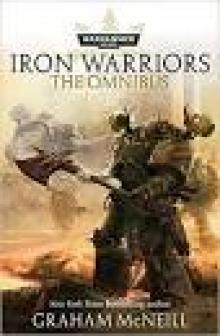 Iron Warriors - The Omnibus
Iron Warriors - The Omnibus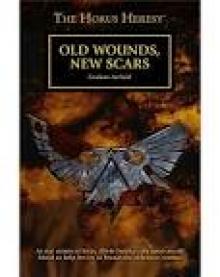 Old Wounds, New Scars
Old Wounds, New Scars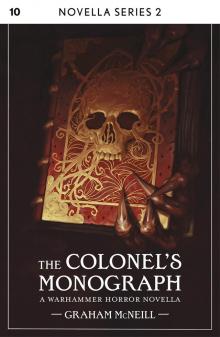 The Colonel's Monograph
The Colonel's Monograph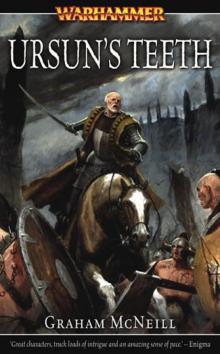 Ursuns Teeth
Ursuns Teeth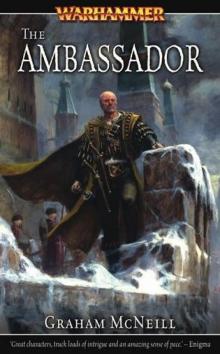 The Ambassador
The Ambassador![[Ultramarines 5] Courage and Honour - Graham McNeill Read online](http://i1.bookreadfree.com/i/03/12/[ultramarines_5]_courage_and_honour_-_graham_mcneill_preview.jpg) [Ultramarines 5] Courage and Honour - Graham McNeill
[Ultramarines 5] Courage and Honour - Graham McNeill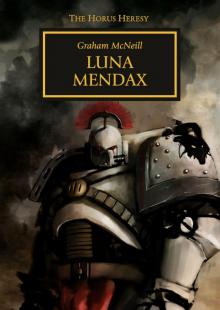 28a Luna Mendax
28a Luna Mendax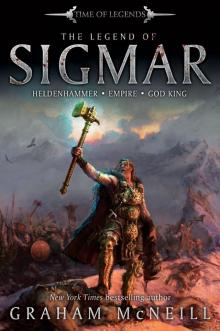 The Legend of Sigmar
The Legend of Sigmar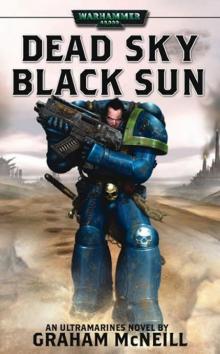 Warhammer - Ultramarines 03 - Dead Sky, Black Sun (McNeill, Graham)
Warhammer - Ultramarines 03 - Dead Sky, Black Sun (McNeill, Graham)![Warhammer - [The Ambassador Chronicles 01] - The Ambassador Read online](http://i1.bookreadfree.com/i/03/17/warhammer_-_[the_ambassador_chronicles_01]_-_the_ambassador_preview.jpg) Warhammer - [The Ambassador Chronicles 01] - The Ambassador
Warhammer - [The Ambassador Chronicles 01] - The Ambassador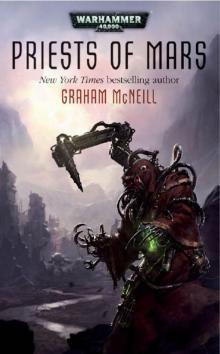 Priests of Mars
Priests of Mars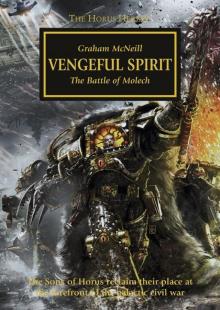 Vengeful Spirit
Vengeful Spirit![[Sigmar 03] - God King Read online](http://i1.bookreadfree.com/i/03/13/[sigmar_03]_-_god_king_preview.jpg) [Sigmar 03] - God King
[Sigmar 03] - God King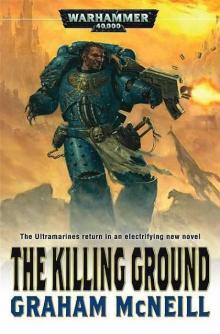 The Killing Ground
The Killing Ground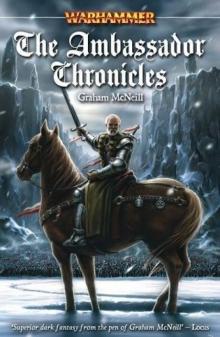 The Ambassador Chronicles
The Ambassador Chronicles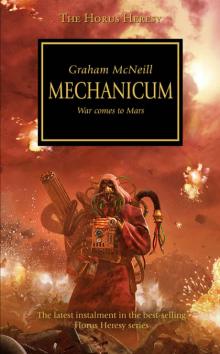 Mechanicum
Mechanicum![[Ulthuan 02] - Sons of Ellyrion Read online](http://i1.bookreadfree.com/i/03/14/[ulthuan_02]_-_sons_of_ellyrion_preview.jpg) [Ulthuan 02] - Sons of Ellyrion
[Ulthuan 02] - Sons of Ellyrion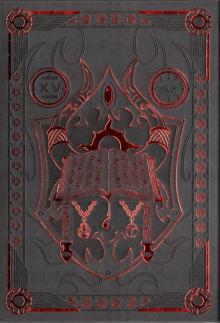 Magnus the Red: Master of Prospero
Magnus the Red: Master of Prospero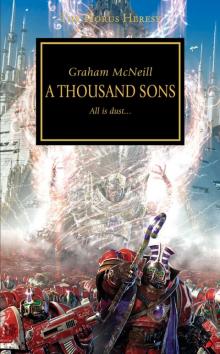 A Thousand Sons
A Thousand Sons![[Warhammer] - Guardians of the Forest Read online](http://i1.bookreadfree.com/i/03/18/[warhammer]_-_guardians_of_the_forest_preview.jpg) [Warhammer] - Guardians of the Forest
[Warhammer] - Guardians of the Forest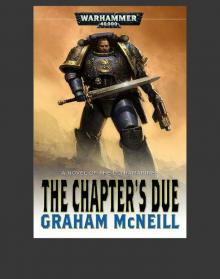 The Chapters Due
The Chapters Due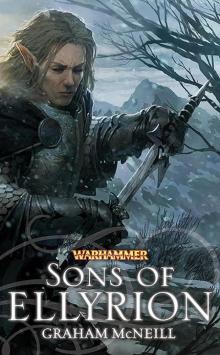 02 - Sons of Ellyrion
02 - Sons of Ellyrion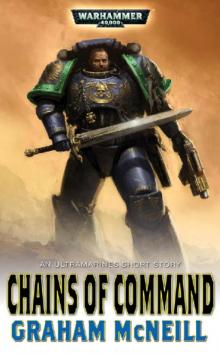 Chains Of Command
Chains Of Command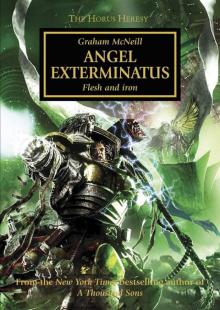 Angel Exterminatus
Angel Exterminatus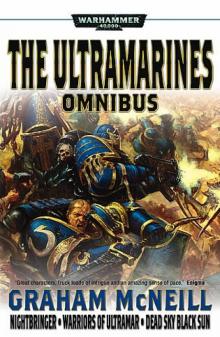 The Ultramarines Omnibus
The Ultramarines Omnibus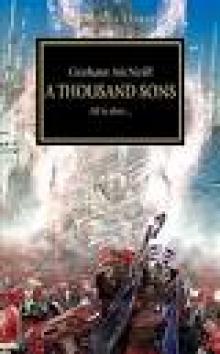 X Marks da Spot
X Marks da Spot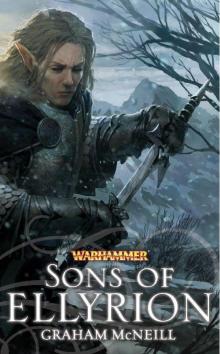 Sons of Ellyrion
Sons of Ellyrion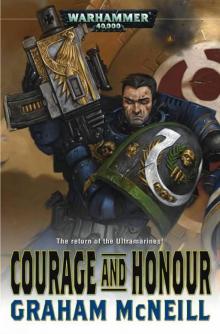 Courage And Honour
Courage And Honour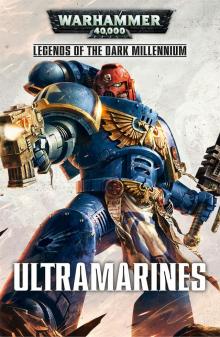 Ultramarines
Ultramarines![[Ulthuan 01] - Defenders of Ulthuan Read online](http://i1.bookreadfree.com/i/03/16/[ulthuan_01]_-_defenders_of_ulthuan_preview.jpg) [Ulthuan 01] - Defenders of Ulthuan
[Ulthuan 01] - Defenders of Ulthuan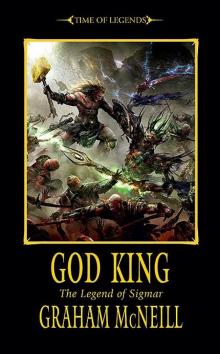 03 - God King
03 - God King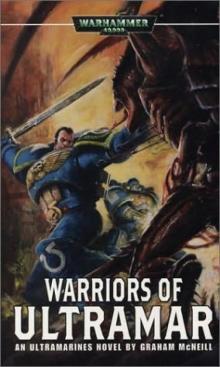 Warhammer - Ultramarines 02 - Warriors Of Ultramar (McNeill, Graham)
Warhammer - Ultramarines 02 - Warriors Of Ultramar (McNeill, Graham)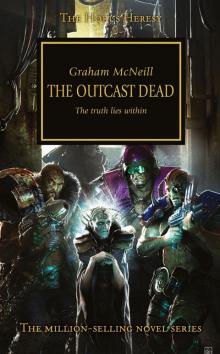 The Outcast Dead
The Outcast Dead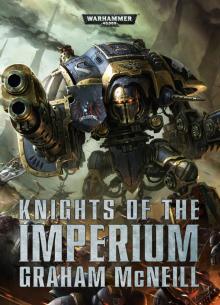 Knights of the Imperium
Knights of the Imperium Defenders of Ulthuan
Defenders of Ulthuan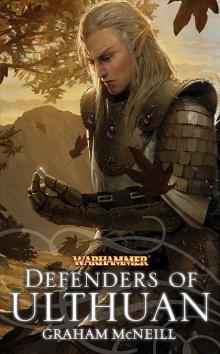 01 - Defenders of Ulthuan
01 - Defenders of Ulthuan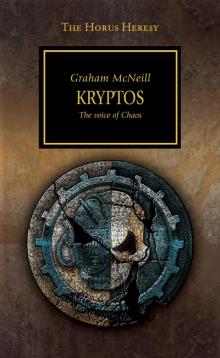 Kryptos
Kryptos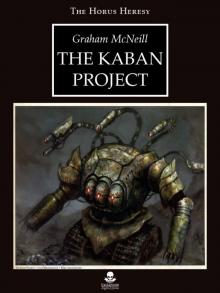 The Kaban Project
The Kaban Project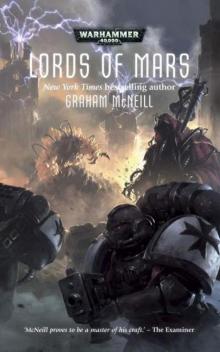 Lords of Mars
Lords of Mars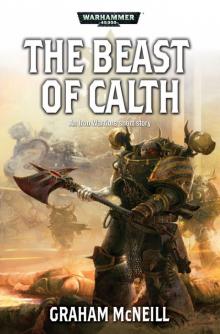 The Beast of Calth
The Beast of Calth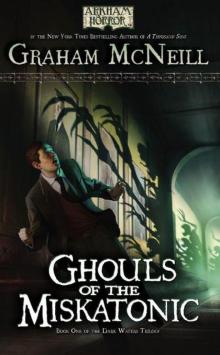 Ghouls of the Miskatonic (The Dark Waters Trilogy)
Ghouls of the Miskatonic (The Dark Waters Trilogy)![[Sigmar 01] - Heldenhammer Read online](http://i1.bookreadfree.com/i/03/24/[sigmar_01]_-_heldenhammer_preview.jpg) [Sigmar 01] - Heldenhammer
[Sigmar 01] - Heldenhammer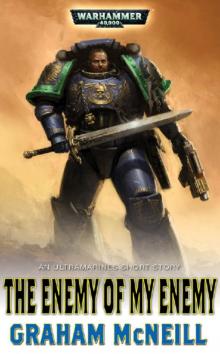 The Enemy Of My Enemy
The Enemy Of My Enemy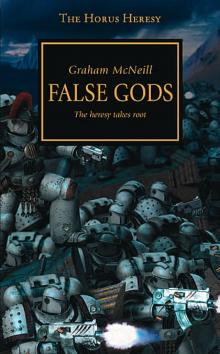 False Gods
False Gods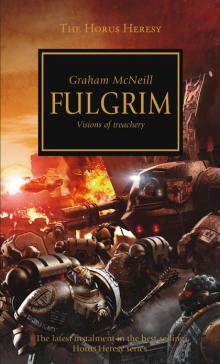 Fulgrim
Fulgrim Mechanicum whh-9
Mechanicum whh-9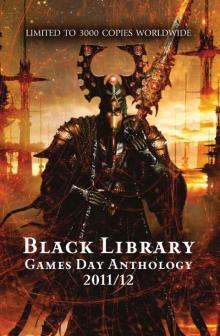 Death of a Silversmith
Death of a Silversmith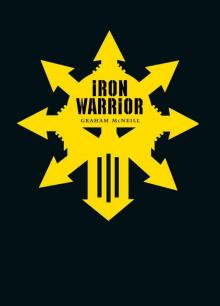 Iron Warrior
Iron Warrior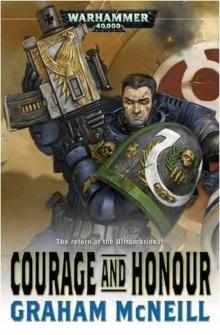 Courage and Honour w4u-5
Courage and Honour w4u-5![[Ultramarines 6] Chapters Due - Graham McNeill Read online](http://i1.bookreadfree.com/i1/03/30/[ultramarines_6]_chapters_due_-_graham_mcneill_preview.jpg) [Ultramarines 6] Chapters Due - Graham McNeill
[Ultramarines 6] Chapters Due - Graham McNeill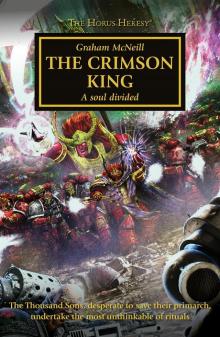 The Crimson King
The Crimson King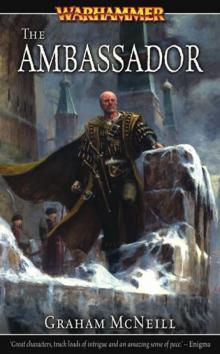 1 the ambassador
1 the ambassador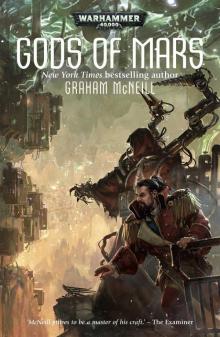 Gods of Mars
Gods of Mars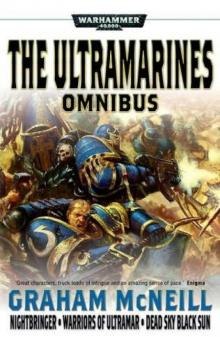 Ultramarines Omnibus (warhammer 40000: ultramarines)
Ultramarines Omnibus (warhammer 40000: ultramarines)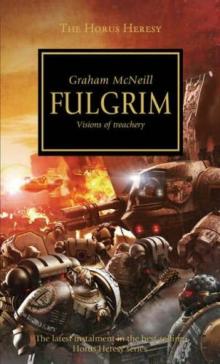 Fulgrim: Visions of Treachery whh-5
Fulgrim: Visions of Treachery whh-5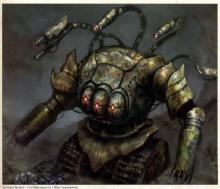 The Kaban Project (warhammer 40000: horus heresy)
The Kaban Project (warhammer 40000: horus heresy)![[Sigmar 02] - Empire Read online](http://i1.bookreadfree.com/i1/04/05/[sigmar_02]_-_empire_preview.jpg) [Sigmar 02] - Empire
[Sigmar 02] - Empire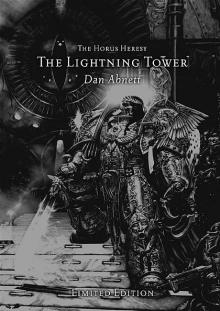 The Lightning Tower & The Dark King
The Lightning Tower & The Dark King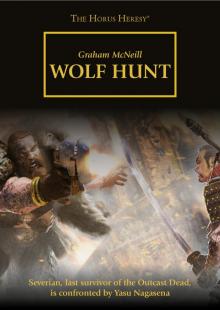 Wolf Hunt
Wolf Hunt Killing Ground w4u-4
Killing Ground w4u-4![Warhammer - [The Ambassador Chronicles 02] - Ursun's Teeth Read online](http://i1.bookreadfree.com/i1/04/05/warhammer_-_[the_ambassador_chronicles_02]_-_ursuns_teeth_preview.jpg) Warhammer - [The Ambassador Chronicles 02] - Ursun's Teeth
Warhammer - [The Ambassador Chronicles 02] - Ursun's Teeth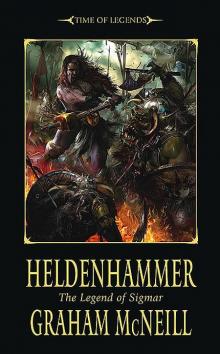 01 - Heldenhammer
01 - Heldenhammer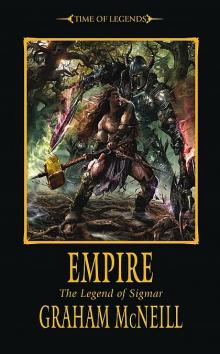 02 - Empire
02 - Empire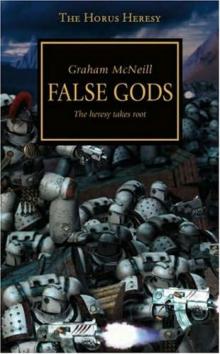 False Gods whh-2
False Gods whh-2